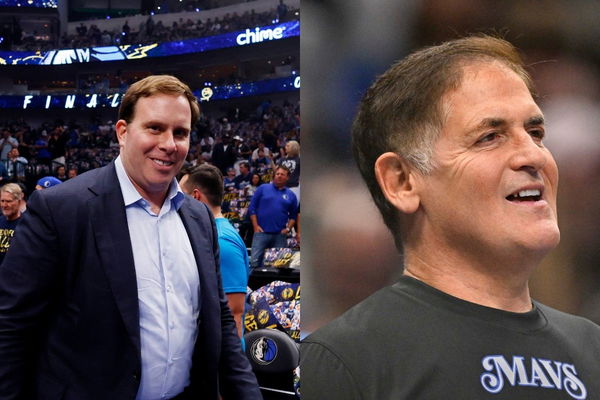
via Imago
Patrick Dumont and Mark Cuban

via Imago
Patrick Dumont and Mark Cuban
“The Dallas Mavericks are not moving to Las Vegas. There is no question in that. That is the answer, unequivocally. The Dallas Mavericks are the Dallas Mavericks and they will be in Dallas.” The new Dallas Mavericks governor, Patrick Dumont, said this about the Luka Dončić’-Anthony Davis trade.
Dumont defended the trade, suggesting it was necessary for the team’s culture, hinting at concerns over Dončić’s work ethic. Despite the backlash, Dumont’s firm stance reflects the new direction under the Adelson family. However, with the dust settling, the question on everyone’s mind is: How exactly did the Adelson-Dumont families end up controlling the Mavericks? So, let’s explore and clear out the doubts.
ADVERTISEMENT
Article continues below this ad
Who are the owners of the Dallas Mavericks? What percent of ownership does Mark Cuban hold?
In 2000, Mark Cuban purchased the NBA’s own Dallas Mavericks, and no one thought he would change everything. He bought a majority stake for $285 million from Ross Perot Jr., and that investment set off a transformative journey. Cuban wasn’t just a businessman; he became a passionate, hands-on owner. His energy and commitment helped turn the Mavs into a championship contender. Under his leadership, the team saw a meteoric rise, like they clinched 18 playoff berths and, in 2011, the ultimate prize—an NBA Championship. The Mavs went from just a team to becoming a reflection of Cuban’s larger-than-life persona.
But all great stories have chapters that evolve. Fast forward to December 27, 2023, when that familiar chapter closed. Casino magnates Miriam Adelson and Patrick Dumont stepped into the picture, acquiring a 69% majority stake in the Mavericks, with a franchise value nearing $3.5 billion. It was a massive shift in ownership. Yet, Cuban was still there.
He held on to 27%, retaining operational oversight. But with Dumont replacing him as the team’s governor, it was clear Cuban’s era of direct control was over.

What’s your perspective on:
Did Mark Cuban sell out, or is he just playing the long game for the Mavericks' future?
Have an interesting take?
Adelson’s deep pockets were essential in making the deal happen. She sold $2 billion worth of Las Vegas Sands stock to fund the purchase. The deal wasn’t just financial; it was personal for those involved. Four minority shareholders exited, but Mary Stanton remained, keeping her 4% stake in the team.
Cuban’s legacy, though, isn’t just about ownership. It’s about the Mavs’ journey under his watch—a legacy of dedication, ambition, and success. The Mavericks’ record of 1,152–782, their playoff appearances, and that unforgettable 2011 championship are all tied to his vision.
But as Cuban stepped back, it marked the beginning of a new era. The Mavericks are now in the hands of new owners but the spirit Cuban instilled in the franchise will forever remain a part of their DNA. However, no, as we do get an idea of what went behind the sale. Let’s get deeper into it.
Why did Mark Cuban sell his majority stake in the Dallas Mavericks?
Mark Cuban’s decision to sell his majority stake in the Dallas Mavericks was driven by a shift in how NBA teams will generate revenue in the future. The high-profile billionaire sees the future of NBA ownership tied not just to basketball, but to his real estate opportunities too, where it will be abundant. In a sense, he was looking ahead, beyond the game itself, and understanding that evolving business landscapes require new partnerships.
Under his stewardship, the Mavericks were always more than just a basketball team—they were an evolving business, constantly adapting to the times. But, as Cuban noted, things were changing.
As we already saw, Miriam Adelson and Patrick Dumont purchased a controlling interest in the Mavs. It was approved in December 2023 and is valued at around $3.5 billion. Cuban recognized the value of aligning with the Adelson and Dumont families, whose ties to the hotel and casino industry could add a new dimension to the Mavericks’ potential.

Before the deal was sealed, Cuban shared his thoughts on the future of NBA ownership. “The advantage is what can you build and where, and you need to have somebody who’s really, really good at that,” he explained. “Patrick and Miriam, they’re the best in the world at what they do. Literally, around the world.”
ADVERTISEMENT
Article continues below this ad
This was his acknowledgment of the changing landscape of the sports business. The partnership with the Adelson-Dumont families offered the Dallas Mavericks an opportunity to tap into the lucrative real estate and hospitality sectors. These areas, he believed, were the future of sports ownership.
His decision also stemmed from his desire to protect the team from future uncertainty. In a world where the future of media rights is increasingly up for debate, Cuban wanted to ensure the franchise’s long-term stability. The Mavericks had been relying heavily on media rights deals. But with Diamond Sports, the company holding regional sports networks, now in bankruptcy, he knew it was time to adapt. “Financially, we’re in a far better position this afternoon than we were yesterday afternoon,” Cuban said, signaling the shift toward new revenue avenues.
Despite stepping down from a controlling role, Cuban isn’t disappearing from the Dallas Mavericks. He retained a 27% stake in the team and will continue to oversee basketball operations. His focus remains on what he loves most—building a championship-caliber team. Yet, he understood the changing tides. “When you get a world-class partner who can come in and grow your revenue base and you’re not dependent on things that you were in the past, that’s a huge win,” he added.
ADVERTISEMENT
Article continues below this ad
The partnership with the Adelson-Dumont families isn’t just about money. It’s about the future, and ensuring the Mavericks are positioned for long-term success. Miriam and Patrick have promised to build on the team’s legacy in Dallas and beyond. Together, they aim to strengthen the franchise’s ties to the community, ensuring it remains a valuable asset.
For Cuban, this sale was about the next chapter—one where real estate and growth play a pivotal role in the future of sports franchises.
ADVERTISEMENT
ADVERTISEMENT
ADVERTISEMENT
ADVERTISEMENT


Did Mark Cuban sell out, or is he just playing the long game for the Mavericks' future?